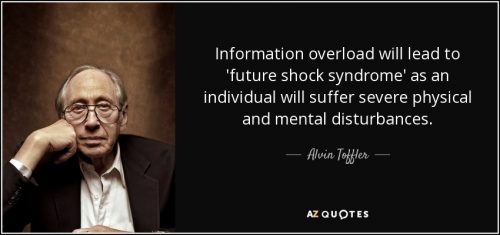“The greatest enemy of knowledge is not ignorance, it is the illusion of knowledge” by DANIEL BOORSTINFor most of the people reading this, you would’ve seen or personally experienced the above list of problems in your life (in different proportions). If yes, you’re a victim of information overload and you would have been facing the following consequences as a result of it.
Consequences of Information overload

- More information complicates the process of understanding and analyzing.
- Too much information is dreadful at first and becomes stressful at the end.
- Diversion & deceiving. More information paves the path to more branches and extends the boundaries, there’s plenty of chance that one may circle around and around.
- Too much research will make you pessimistic. Sometimes the more we know, the more we think about the possibilities of failure at every point of our plan.
- Consumes your limited energy of the day. Reading and processing information takes up all your day’s focus and mental energy.
- Losing what is important to you the most, when your list is flooded with tonnes of information from the various point of sources.
- and many more…
How to fight Information Overload
The first of everything to fight information overload is to cut down the information that flooding in. When I say information, that includes everything. A mail, an article you see when browsing the internet, an Instagram notification, anything from trivial to critical.-
Cutting down sources – If you see a source that gives you trivial and unuseful information, immediately stop them from occurring again. Eg. If it is a newsletter then unsubscribe it.
-
Spruce up your settings in such way only minimal and important data knock your attention. Tune your phone’s notification settings. Eg. Muting Group notifications in WhatsApp.
- Paradigm shift – No, not all the information are important to you. Understand the difference between unnecessary curiosity and the need.
What to do when facing a information?
-
Now or Later – Whenever a information comes to your attention, you have two options. Either you need to go through it immediately or later. There may be various reasons like urgency, importance and others to make you feel you must take it immediately. If you can digest them at the moment you received, then do that. Else just divert it to the place from where you can read them later. Let’s name the place ‘Later Inbox’. I use Evernote & Pocket apps to put my information in.
- Fix a filter to ‘Later Inbox’ – Don’t just pass on every information to ‘Later Inbox’. Give it a glance, be a judge, if it is really worthy, then push it in.
- Take only Time-bound content – When you search for information, take only what you can use immediately or what you can put on in action now or in very near future. This applies to everyone who got carried away in browsing.
How to lighten the information overload?
- Organize – If you followed the above steps, your ‘Later Inbox’ have hundreds of information to process now. No, not now. Try to roughly organize the content based on time, project area and many other contexts. When I say time, some information needs your attention on or before some particular time, then prioritize the content first. Some information may relevant to your family, some towards your career. Just put them in separate places/folders. (If it is Evernote, have separate notebooks, use tags in case of Pocket). Give importance to Time-bound content and put them at first in the list.
How to digest information optimally?
-
Based on goal – The more you funnel your vision, the more you move towards the success. Take only what is needed. You’ve already categorized your contents when you organize the ‘Later inbox’. Just pick the contents based on the context. First work for the need of the hour.
- Scheduled consumption – Process information only at the scheduled time you allocated for the particular project/context. Eg. Process your career-related information at work and read the news in the evening.
- Set Deadlines – Set a specific amount of time and limit the contents unto which you can consume within that time. This will force you to take only the content which you feel important and must. If something is left in the list, then just leave them for next turn. Working with a deadline also increases the focus.
- Optimal consumption – Most of the time, your reading list is filled with repeated info, same content in different perspective and phrases. Do not go from A to Z. Work on important information when you’re highly active.
- Repeat & improvise – Make it a habit… Slowly you can completely get rid of information overload.
Finally, these are the set of rules (methods) I follow to increase my productivity by evading information overload. I shared them here to give an idea to people who wants to fight the real problem practically. At first it may look like a tedious process, but later you’ll thank yourself for trying this. Good luck!
